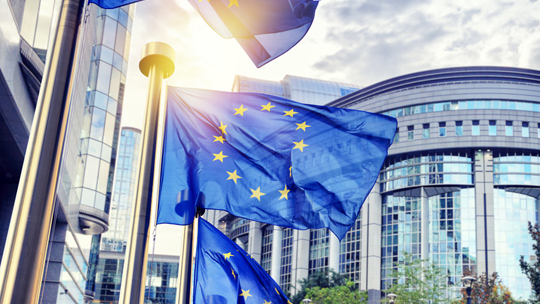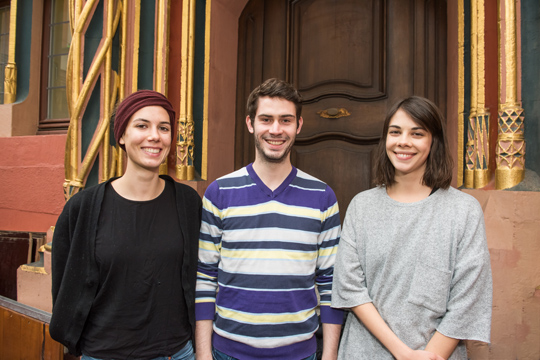First-class friends of Europe
Freiburg, Dec 14, 2017
The Brexit vote, Trump’s election, the rise of the AfD – eventually Benedikt Kau, Hans-Christoph Schlüter and Mirko Moser-Abt had had enough. For a few days the three men kicked ideas around. In the end, they got together in Freiburg university library and formed the WhyEurope group. It was almost on a whim or momentary impulse, Kau recalls, “Brexit was the actual trigger. We thought, ‘Now it’s time to get active and promote pro-European things.’” Their commitment has paid off: in November 2017 they received the European Public Communication Award from the European Commission.

In November 2017 „WhyEurope“ visited the European Parliament in Brussles/Belgium to receive an award. Photo: Grecaud Paul/Fotolia
In summer 2016 the student and his colleagues – themselves now alumni of the University of Freiburg – set up a Facebook page and uploaded “a couple of funny pictures” that they had just created. “It was at the time of the Pokémon Go phase. So we posted, ‘Pokémon don’t stop at borders.’” So the theoretical birth of the initiative was also its practical realization. At the start they got just a few likes, but now there are almost 2.5 million users a month who rate the page with a ‘thumbs up’. Kau, Schlüter and Moser-Abt soon found more comrades-in-arms.
“How populists communicate is often very successful. We want to convey a ‘positive populism’ – just as simple, real and emotional,” explains Kau, who studies Liberal Arts and Sciences at University College Freiburg. Today, a team of 23 from many countries posts content on the three channels Facebook, Twitter and Instagram in four languages: German, English, French and Hungarian. Decidedly pro-European!
Presenting the advantages
Amelie Kircher, a student of Applied Political Science, and Vera Königsmann, a student of European Ethnology, both from Freiburg, have also joined in. Another alumni on board is Clémence Haacke. They are all committed to the idea of a united Europe and want to remind their generation, which had no experience of the Cold War or the Berlin Wall, of the advantages of Europe. Advantages which many today take for granted – whether it’s the single market, freedom of movement – or peace.

Amelie Kircher, Benedikt Kau and Vera Königsmann (l to r) want to offer a positive populism for Europe – not just in front of the Whale House where Erasmus of Rotterdam lived during his time in Freiburg. Photo: Klaus Polkowski
The group highlights these and other achievements with casual and witty posts. Take for example the picture of four female backpackers at the station. Underneath, the message is: “Life is too short to only see one country.” Regardless of whether they are looking at the famous (or notorious) amount a cucumber is permitted to bend, the ban on animal testing of cosmetic products, or compensation for airline passengers, the makers of WhyEurope illustrate the apparently abstract or complex with a lot of pictures and a few words. And they are doing this so impressively and with such a reach that even Brussels has noticed the initiative: in November 2017 the team visited the European Parliament to receive the European Public Communication Award for their work from the European Commission.
Closeness and distance
“That was a major accolade for the team,” smiles Amelie Kircher. Nevertheless she distances herself a little from the “EU in its current form”. Benedikt Kau also plays it down, “We’re not the marketing agency for the European Union,” he adds, laughing. “We’re just a few students uploading pictures.” “And we want to keep it like that, seriously and in the long term,” continues Vera Königsmann. After the fans of Europe designed the campaigns ‘Blijf bij ons’ and ‘Restez avec nous’ for the elections in the Netherlands and France this year, they want to tackle the European elections that are coming up at the start of 2019. In a decidedly pro-European way, of course!
Alexander Ochs

